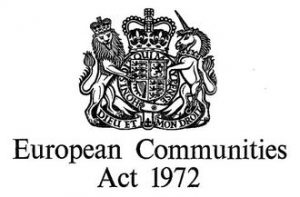By Dr Eirik Bjorge, Senior Lecturer in Public International Law (University of Bristol Law School).
 According to a carefully argued contribution by Professor Finnis in the Miller debate, rights under the European Communities Act 1972 ‘are not “statutory rights enacted by Parliament”’; they are only ‘rights under the treaty law we call EU law, as it stands “from time to time”’. Finnis thus purports to have broken the chain of the claimant’s main argument.
According to a carefully argued contribution by Professor Finnis in the Miller debate, rights under the European Communities Act 1972 ‘are not “statutory rights enacted by Parliament”’; they are only ‘rights under the treaty law we call EU law, as it stands “from time to time”’. Finnis thus purports to have broken the chain of the claimant’s main argument.
In that connection, Finnis considers the somewhat recherché example of taxation treaties and the Taxation (International and Other Provisions) Act 2010 to be a useful analogy. The point of the present contribution is to suggest that a more natural analogy would be the Human Rights Act 1998 and the European Convention on Human Rights (ECHR). Like the ECA 1972, the HRA 1998 conditions the legal relationship between citizen and state in an overarching manner and deals with fundamental constitutional rights. There is also particularly instructive judicial authority on the HRA 1998 specifically on question of the nature of its relationship with the international treaty whose obligations it mirrors.
Finnis understandably lays store by the point that the ECA 1972 s. 2(1) gives effect in UK law to ‘all such rights … from time to time created or arising by or under the Treaties’. These rights, he observes, are thus subjected to alteration by decisions made in the international realm in which, by exercise of its prerogative, the Crown participates.
The same is the case with the HRA 1998. In s. 1 the HRA 1998 defines the concept of ‘Convention rights’ by reference to certain articles of the Convention. Furthermore the HRA defines ‘the Convention’ as the European Convention ‘as it has effect for the time being in relation to the United Kingdom’: s. 21(1). No doubt, these words should be deemed to be ‘always speaking’; ‘[t]he general presumption is that an updating construction is to be applied’ (Fitzpatrick [2001] 1 AC 27, 50 (Lord Clyde)).
The fact that the statutory rights enacted by the HRA 1998—the ‘Convention rights’—at any given point in time mirror the relevant parts of the Convention ‘as it has effect for the time being in relation to the United Kingdom’ means that if, through agreements reached in the Council of Europe, the content of the international rights change, so too does the content of the statutorily enacted ‘Convention rights’.
A recent example is Protocol 15 to the ECHR (CETS No 213), which stresses the importance of subsidiarity and the margin of appreciation in relation to the interpretation and application of the rights of the Convention. Signed and ratified by the United Kingdom, this Protocol will upon entry into force change aspects of the provisions of the Convention ‘as it has effect for the time being in relation to the United Kingdom’, thus also changing the statutorily created British ‘Convention rights’.
In spite of this set up, there can be no cavil with the proposition that the ‘Convention rights’ are ‘statutory rights enacted by Parliament’; indeed Finnis seems to have recognized as much himself in a different connection: ‘A British “Convention right” to assistance in suicide?’ (2015) 131 LQR 1, 2.
Many high judicial authorities make it clear that Convention rights are statutory rights enacted by Parliament. According to Lord Nicholls in Quark Fishing, the obligations set up in UK law by the HRA 1998 ‘mirror in domestic law the treaty obligations of the United Kingdom in respect of corresponding articles of the Convention’: [2006] 1 AC 529, 545 at [33]. Indeed, growing impatient with the repetition of the solecism that Convention rights were no more than rights under treaty law, Lord Hoffmann in McKerr observed that, ‘[i]t should no longer be necessary to cite authority for the proposition that the Convention, as an international treaty, is not part of English law’; ‘[w]hat the Act has done is to create domestic rights’ ([2004] 1 WLR 807 at [63]).
Similarly the source of EU rights is the European Communities Act 1972, not the EU Treaties; our rights under the ECA 1972 are in the fullest sense of the word domestic rights created by statute. Being statutory rights enacted by Parliament, they cannot be destroyed by executive action without Parliamentary statute.

Nice argument. But the context is different. EU law itself requires that the ECA does not enact rights (at least not directly effective rights). Indeed, it would be a violation of EU law if the ECA did enact directly effective rights. Which means, I think, that in relation to these rights, at least, the ECA itself gives the answer: it is a mere funnel. Whether it is also a funnel for other EU rights is more debatable. But again, EU law consistently diminishes the agency of the MS whenever it gets a chance (e.g. re national ‘implementing’ measures under Art 263(4)). That should count for something, under the ECA no less.
Not ‘funnel’ but ‘channel’. Or ‘conduit’.
Dear Lorand, many thanks for this. I am not sure I follow you when you say that EU law requires that the ECA not enact rights (at least not directly effective rights). Is your view that this is what follows from Van Gent en Loos and later cases in the same vein? Best, Eirik
The point is that national law is a funnel: see e.g. Case 39/72, para 17.